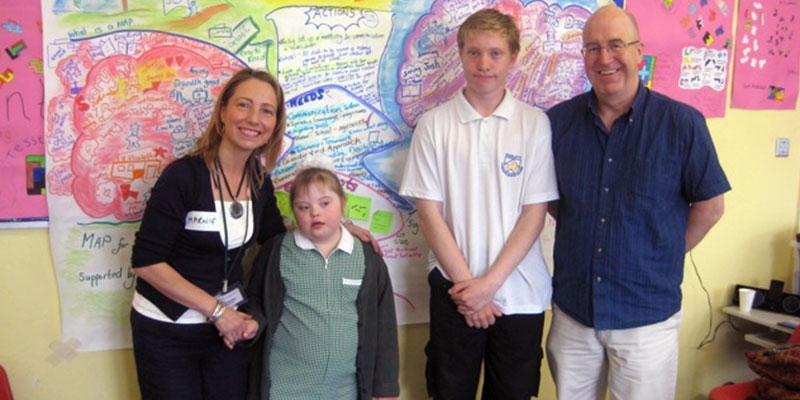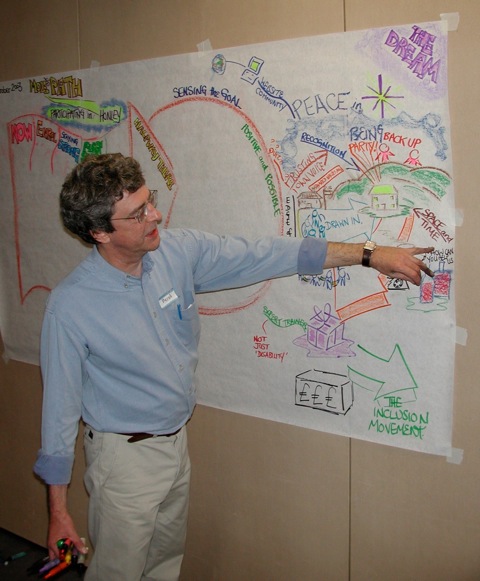
Educational Psychologists and Person Centred Planning
There is growing interest nationally from Educational Psychology Services in the use of person centred tools to support complex planning and transition work. We have recently worked with Psychology teams (and other Children’s Services support staff) in the London Borough of Brent, North East Lincolnshire, Warwickshire and in East Lothian providing an introductory day on person centred planning approaches as described below.
Educational Psychologists and Person Centred Planning
Course Category
Person Centred Planning
Strategic Work Visioning
Problem Solving
Description
New Tools for Co-ordinating Support Plans An Introductory Day led by Derek Wilson and Colin Newton
There is growing interest nationally from Educational Psychology Services in the use of person centred tools to support complex planning and transition work. We have recently worked with Psychology teams (and other Childrens Services support staff) in the London Borough of Brent, North East Lincolnshire, Warwickshire and in East Lothian providing an introductory day on person centred planning approaches as described below. Contact us for more detail on how this can be delivered to your team or service. Person centred planning is a way of expressing a set of inclusive values through a unique range of tools and techniques. The most commonly used person centred tools – MAPS and PATH – create a hands-on demonstration of these values in action. All person centred planning tools and processes are driven by a commitment to achieve inclusive outcomes for the person whose plan it is, and the young people involved are always present throughout their planning session. The focus of all person centred approaches is the whole person irrespective of the label they carry. Two people – a process facilitator and a graphic facilitator, typically facilitate plans. The role of the Educational Psychologist in this work is as a facilitator not as expert participant, problem solver, assessor or provider of consultation.
Follow the link to read a detailed thesis by Dr Margo Bristow on the use of PATH by educational Psychologists in the UK.

The findings indicate that PATH impacted positively and pupils attributed increased confidence and motivation to achieve their goals to their PATH. Parents and young people felt they had contributed to the process as equal partners, feeling their voices were heard. Improved pupil- parent relationships and parent-school relationships were reported and the importance of having skilled facilitators was highlighted. Although participants were generally positive about the process, many felt daunted beforehand, possibly due to a lack of preparation. Pre-PATH planning and post-PATH review were highlighted as areas requiring further consideration by PATH organisers. Recommendations to shape and improve the delivery of PATH are outlined together with future research directions.
Testimonials
‘Thanks again for a superb day which from my perspective as PEP has been a real boost and uplifted my spirits about helping move the EPS forward as well as gaining greater insight and understanding of individual EPs. Several EPs have said that they are planning to use MAPS and PATHS in their work and I will be joining them.’
Dr Michael Hymans, PEP, London Borough of Brent
Learning Objectives
- To examine how best educational psychologists can use person centred processes in their work
- Exploration of the values underpinning person centred working
- Understanding process and graphic facilitation in person centred work
- An introduction to the person centred planning tools
- MAPS and PATH with live demonstrations of the tools in action
Who Is It For?
- Educational Psychology Services and those they work with.
Course Content
- Exploration of the values underpinning person centred working
- How person centred planning naturally captures young people’s strengths and capacities
- How person centred planning encourages meaningful consultation and participation with young people (particularly for those who cannot make their views known in typical ways
- Person Centred Planning and the building of stronger parent/school partnerships
- How person centred planning can promote multi-agency teamwork and shared responsibilities
- Understanding the how of process and graphic facilitation in person centred planning work
- An introduction to the person centred planning tools
- MAPS and PATH – live demonstrations of both tools in action followed by real time coaching of facilitation skills
If you liked this course you may well like:
Trackback from your site.